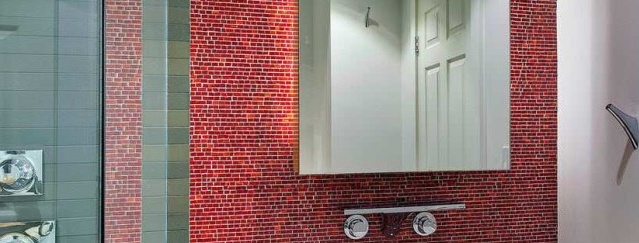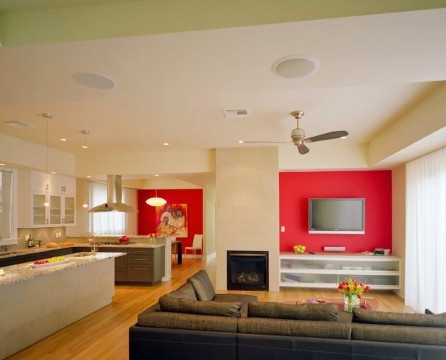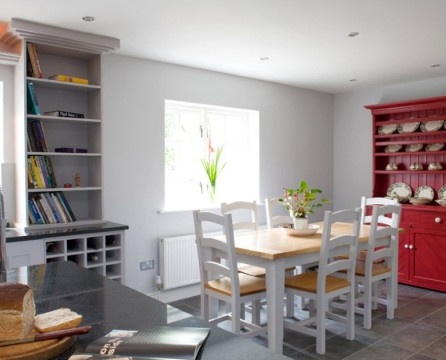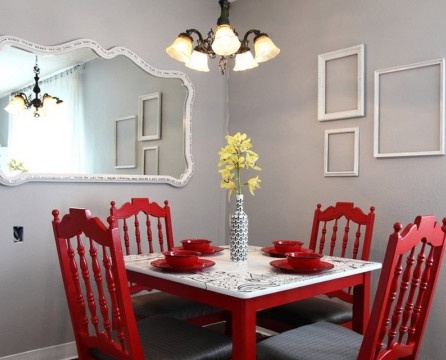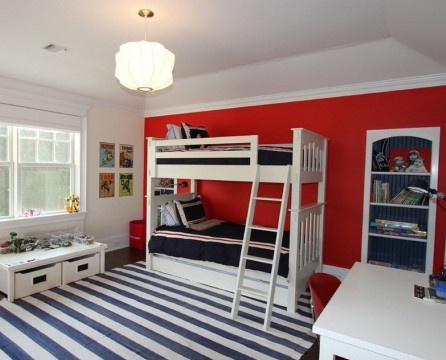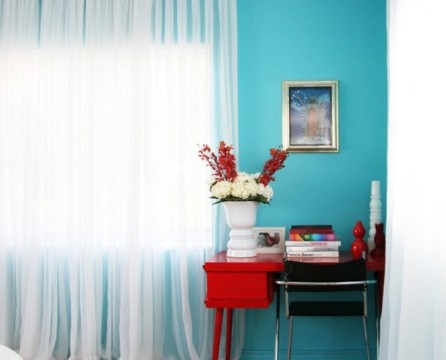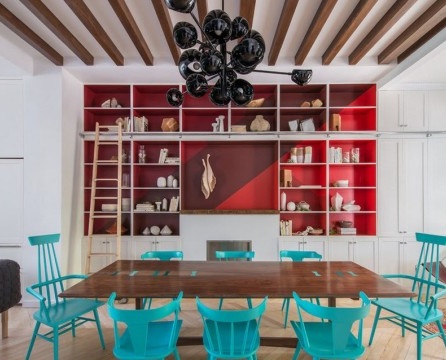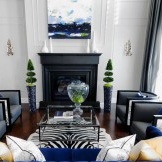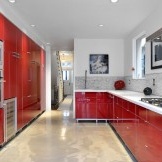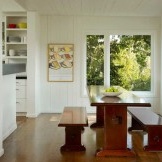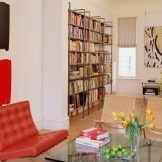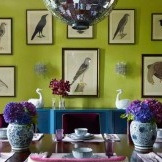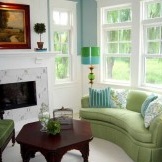Rules for combining red
If speak about red the interior, the attitude towards it is ambiguous. On the one hand, it excites, prompts to action, attracts attention to itself. But there is another side: for many, this color is defiant and even vulgar. In general, the red interior will appeal to only those people who are positive about this color.
Cozy in such an interior will be strong and domineering people, this is often due to the fact that the color symbolizes fire and blood, it has a very strong energy. According to Feng Shui, this color is referred to the masculine principle, that is, the energy is yang, and for the Japanese, red is the color of anger.
Recently, color treatment has been increasingly practiced, and so with the help of red, anemia, depression and liver diseases are treated. But with hypertension, this color is contraindicated, as well as if a person has an unstable psyche or emotional imbalance.
Many designers like to create interiors in such a bright and active design. But few decide to make the interior completely red or at least leading. But in fact, if you pay attention to the many shades of red, you can create magnificent interiors: stylish, not aggressive or flashy.
Like all other colors, red has advantages and disadvantages, but incorrect design with this color can very negatively affect the human psyche.
- With proper delivery and in a small amount, it cheers up, and even increases energy.
- Creates a festive mood. Red accessories will add solemnity to any interior.
- Gives a feeling of luxury.
Knowing all these and many other subtleties, you can create cozy red interiors, but it is better if they are diluted with other colors.
Red and white
Red and white interiors seem boring to many, but in fact it is a magnificent and win-win combination. Moreover, this duo does not require additional accents of other colors that can only spoil the picture. Unless you can use a smooth transition from shades of red, this will give the interior dynamics.
To make this combination look cozy and comfortable, you can use the technique of patterned and plain objects. Where exactly the pattern will be, and where the uniformity is up to you, but the main thing is not to use both in the same amount. For example, if your goal is to make the room plain, then add a couple of objects with a pattern and, conversely, make one or two plain accents in the patterned interior. For example, in a plain dining room pattern can be on the carpet.
And in the patterned bedroom, make the walls plain.
As for color perception and decor in red and white interiors? For a relaxed atmosphere with bright accents take the technique of "red on white".
But if you take the reverse technique of “white on red”, then you expect to get a sharp and flashy interior? No, quite the opposite. In practice, it is clear that a harmonious atmosphere is obtained. The fact is that white can never be an accent, its neutrality puts everything in a balanced mode.
Red and beige
Such an interior will be soft and calm due to the influence beige colors. And red will help to avoid boredom and add dynamics. As in combination with white, other colors are not needed for this union, there is nothing to add or touch up. The question will only be what color will be leading. Most often it is beige. Then the atmosphere will be cozy and inviting. And adding a pattern or masonry will bring liveliness.
Shades such as sand, straw and earth are more suitable for saturated red. And for beige, as well as other neutral colors, all shades of red, including cold scarlet, thick raspberry and wine and others, are suitable, in general. In this regard, it is convenient to select paints, materials and accessories.
When using soft and pale shades of both colors, you can achieve excellent results when creating retro style. Indeed, this combination appeared a very long time ago and even applies to classics. But everything new is well-forgotten old, so now this combination is becoming fashionable and gets along well in modern styles.
By the way, it will be a big mistake to use only one shade of beige in this duo, then the interior will be monotonous and a little boring. To avoid this, it is better to use smooth color transitions from various shades of beige. And also, if beige is chosen as the background, and the red accent should be large, or there should be several of these accents, otherwise they will be lost regardless of their brightness.
Red and Blue (Turquoise)
Very rarely you can find such a combination due to the antagonism that they represent. Blue (blue) is ice, and red is flame. There is even such a song, “Ice and Fire,” but this is not about that now. So, because of such a clear "spontaneous" contradiction, few decide to create such an interior. After all, both of these colors have different temperature effects. But in reality a very comfortable atmosphere can be obtained if the emphasis is correctly distributed, of course. So, it is precisely on what color will be soloing, and which complementary and the temperature of the room will depend on. If you want to make it warm, take red as a background, and blue to complement the picture. For a cool interior, blue should be dominant, and red should be an accent.
This duet is also often used on a white background, white, as it were, neutralizes heat and cold and leads them to some stability.
A great option for a red-blue interior would be for children's room, only on condition that the main color is blue, and then in a pale version. You can even create a marine plot.
For the bedroom, it is also better to choose light blue as the dominant, and emphasize respectability and sophistication in red.
As for the selection of shades, various shades of red are suitable for blue, their use will save the room from color disharmony. And if you take the blue color, then it is better to select saturated tones of red.
If you want to make the interior unusual, then take the union of red and turquoise. Such an interior will provide a good mood and a sense of comfort and prosperity.
The red-turquoise interior feels energetic fullness, which is saturated with something unreal, not from this world, but at the same time reliable.
Also not the most popular color combination, but quite interesting. Here, too, a clear conflict is felt. But what is most attractive is that we constantly observe this duet in nature. Strawberries, strawberries, raspberries, red apple, watermelon, tomato, that is, all the fruits and vegetables are red with a green tail.As well as many flowers. And if nature itself brought these colors together, then we should be afraid! You just need to correctly distribute the roles, as in the example of blue. The temperature accent method will also work here. For a warm atmosphere, red will be the leader, and for a cool one, green.
Soft shades of green, with a warm tone, perfectly complement and refresh the rich red interior. The room will be warm, but in a moderate form.
Most often, if the leader is green, then you can add neutrality to white. And if the solo is red, it is better to add beige or the color of natural wood.
Red and brown are related colors, so this duet in the interior looks very harmonious. This happens due to the fact that the red color is part of complex dark brown shades. The restraint and earthiness of the brown personifies stability and industriousness, and if in the interior it shades red, the atmosphere looks noble and solid.
Combination burgundy and dark brown is used to create a restrained and rigorous english style.
And if you add golden shades, you can reproduce the pomposity Victorian style.
If you take this union for the living room, it is best to dilute it with a white background. The interior will be catchy, but not artsy; bright but not flashy.
In general, such a tandem is very good where wood is used, the atmosphere becomes warm, cozy and so homely. Wood perfectly emphasizes red interiors, giving them a gloss, nobleness and grace, it is not for nothing that mahogany products are so appreciated.
Red and Orange (Yellow)
This is a very warm combination of colors, before proceeding with this design, it is necessary to take into account which way the windows of the room go. If it’s sunny, then the red-orange interior will make the room too hot. Also, do not use this union in children's rooms if the children are hyperactive, as this will lead to increased nervous excitement and it will be difficult for the child to focus on anything. In general, such an interior is charged with energy and a cheerful sunny mood. For living rooms this is a very good design, especially if the windows are few or small.
Regarding shades, designers advise combining with red to take a shade of orange that contains more yellow, this will help to avoid color mixing.
And if you want to make a contrast transition, then you can take red, reddish-orange or saturated Orange and dark yellow, but be sure to dilute them with a pastel palette and, for example, black accents.
Red-orange or red-yellow interiors are filled with summer and sunny mood, it will always be warm or even hot, depending on the chosen tones.
And to make the room more calm and not so intense, dilute these colors with a white or pastel palette.
Red and black
This combination of colors has an ambiguous attitude: it seems gloomy to one, and attractive to the other. Many people choose this union of colors when creating gothic image, sometimes adding white.
In general, the combination of red and black in its pure form can be met quite rarely, due to the inhibitory effect. Therefore, most often in such interiors there are colors - “neutralizers” that soften the feeling of gloominess of this duet. Basically it is a white, gray or pastel palette.
Another technique that emphasizes the sophistication of this tandem and relieves stress is the minimum amount of black.
You can also add gold a shade that will make the interior rich and relieve gloom.
A couple more subtleties: for greater respectability, choose darker red tones for this duet; To make the space voluminous, use more white and less black.
The combination of red and black, richly diluted with white, removes gloom, leaving only a magnificent contrast effect. After all, these three colors are the main among all world cultures. Why is that? Because red is an unrivaled accent, and black and white are definiteness. And such interiors - like other manifestations of red - are usually chosen by balanced people with a strong-willed character.

